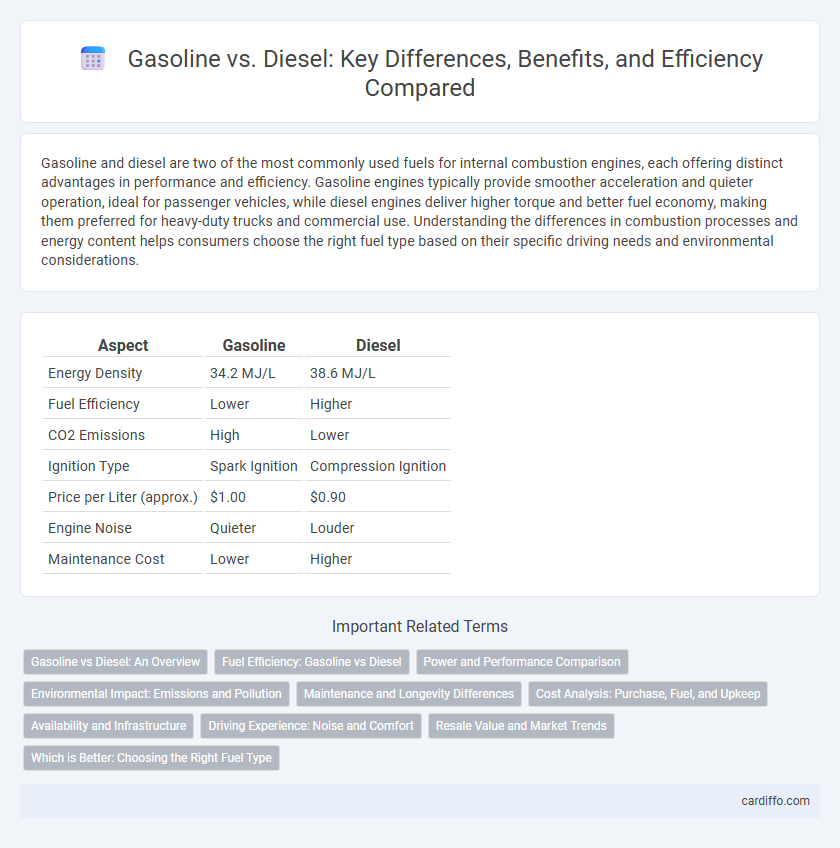Gasoline and diesel are two of the most commonly used fuels for internal combustion engines, each offering distinct advantages in performance and efficiency. Gasoline engines typically provide smoother acceleration and quieter operation, ideal for passenger vehicles, while diesel engines deliver higher torque and better fuel economy, making them preferred for heavy-duty trucks and commercial use. Understanding the differences in combustion processes and energy content helps consumers choose the right fuel type based on their specific driving needs and environmental considerations.
Table of Comparison
| Aspect | Gasoline | Diesel |
|---|---|---|
| Energy Density | 34.2 MJ/L | 38.6 MJ/L |
| Fuel Efficiency | Lower | Higher |
| CO2 Emissions | High | Lower |
| Ignition Type | Spark Ignition | Compression Ignition |
| Price per Liter (approx.) | $1.00 | $0.90 |
| Engine Noise | Quieter | Louder |
| Maintenance Cost | Lower | Higher |
Gasoline vs Diesel: An Overview
Gasoline and diesel are two of the most commonly used fuels for internal combustion engines, each with distinct chemical compositions and combustion characteristics that impact engine performance and emissions. Gasoline, primarily composed of hydrocarbons with shorter carbon chains, ignites more easily and offers higher RPM capabilities, making it ideal for light-duty vehicles and performance applications. Diesel fuel contains longer hydrocarbon chains, providing higher energy density and better fuel efficiency, especially in heavy-duty engines and commercial transport vehicles, while producing greater torque and lower carbon monoxide emissions compared to gasoline.
Fuel Efficiency: Gasoline vs Diesel
Diesel engines typically deliver higher fuel efficiency compared to gasoline engines due to their higher energy density and combustion process, allowing diesel vehicles to travel longer distances on less fuel. Gasoline engines often have lower thermal efficiency and burn fuel less completely, resulting in reduced miles per gallon (MPG). For applications requiring extended range and fuel economy, diesel remains the preferred choice in commercial and heavy-duty vehicles.
Power and Performance Comparison
Diesel engines deliver higher torque at lower RPMs, making them ideal for heavy-duty applications requiring strong pulling power and better fuel efficiency. Gasoline engines typically offer higher horsepower and faster acceleration, providing a smoother and more responsive driving experience. Performance preferences depend on vehicle use, with diesel excelling in towing and long-distance fuel economy, while gasoline suits sporty and lighter vehicles.
Environmental Impact: Emissions and Pollution
Gasoline engines emit higher levels of carbon monoxide and hydrocarbons, contributing significantly to urban smog and ground-level ozone formation. Diesel engines, while producing less carbon monoxide, release more nitrogen oxides (NOx) and particulate matter (PM), which are linked to respiratory problems and environmental acidification. Regulatory measures targeting diesel exhaust have driven advances in emission control technologies, yet both fuel types remain key contributors to air pollution and climate change.
Maintenance and Longevity Differences
Diesel engines generally require less frequent maintenance than gasoline engines due to their robust construction and lower RPM operation, which reduces wear and tear on components. Fuel injection systems and glow plugs in diesel engines demand specialized care, while gasoline engines rely on spark plugs and simpler fuel delivery systems that often require more regular attention. Diesel engines typically offer greater longevity, often exceeding 300,000 miles, whereas gasoline engines commonly achieve around 150,000 to 200,000 miles with proper maintenance.
Cost Analysis: Purchase, Fuel, and Upkeep
Gasoline vehicles generally have a lower initial purchase price compared to diesel counterparts but tend to incur higher fuel costs due to lower fuel efficiency. Diesel engines offer better mileage per gallon, reducing fuel expenses, but maintenance and repair costs are often more expensive due to complex components such as turbochargers and particulate filters. Long-term cost analysis favors diesel for high-mileage drivers despite the upfront premium and higher upkeep expenses, emphasizing fuel economy and engine durability as critical factors.
Availability and Infrastructure
Gasoline enjoys broader availability due to its extensive global distribution network, making refueling accessible in most urban and rural areas. Diesel infrastructure, while robust in industrial and commercial zones, remains less widespread for general consumer vehicles, often concentrated around freight corridors and agricultural regions. This disparity impacts vehicle choice based on regional refueling convenience and fuel station density.
Driving Experience: Noise and Comfort
Diesel engines generally produce more vibration and noise compared to gasoline engines, affecting cabin comfort and driving experience. Gasoline vehicles typically offer smoother and quieter rides due to higher engine speeds and refined combustion processes. Noise reduction technologies in modern diesel vehicles have improved comfort, but gasoline engines remain preferable for those prioritizing quietness and smoothness.
Resale Value and Market Trends
Diesel vehicles generally maintain a higher resale value compared to gasoline counterparts due to their superior fuel efficiency and durability, particularly in commercial and heavy-duty segments. Market trends indicate a growing demand for diesel engines in trucks and SUVs, driven by rising fuel costs and increasing preferences for long-distance travel efficiency. However, stricter emissions regulations and advances in gasoline engine technology are gradually narrowing the resale value gap between diesel and gasoline vehicles.
Which is Better: Choosing the Right Fuel Type
Diesel fuel offers higher energy density and better fuel efficiency, making it ideal for heavy-duty vehicles and long-distance driving, while gasoline provides smoother engine performance and lower initial costs, suitable for lighter vehicles and urban commuting. Diesel engines typically deliver more torque and improved mileage, but gasoline engines emit fewer nitrogen oxides and particulate matter, which affects environmental considerations. Choosing the right fuel depends on vehicle use, fuel economy priorities, maintenance costs, and emission standards in your region.
Gasoline vs Diesel Infographic

 cardiffo.com
cardiffo.com